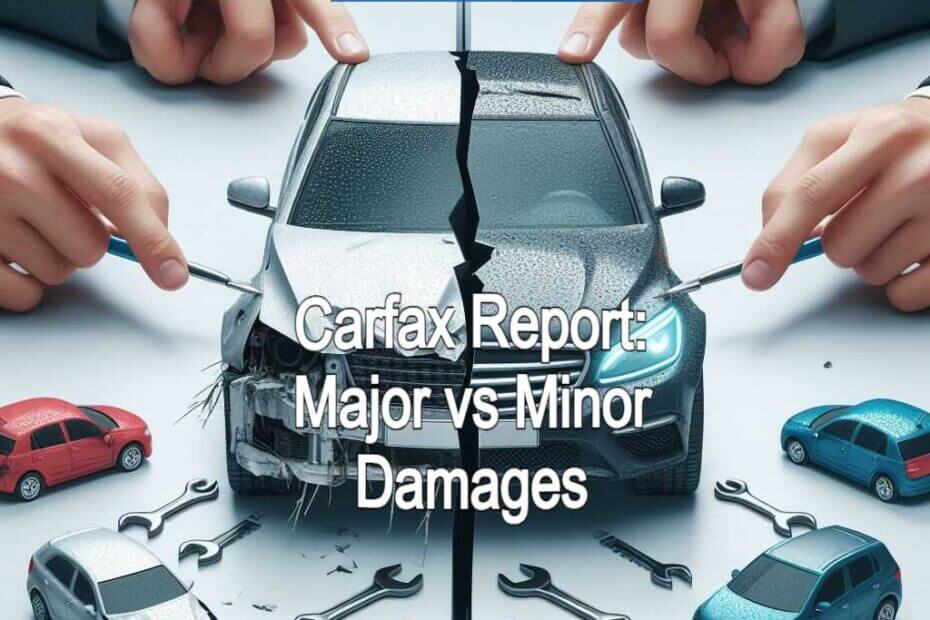Carfax Minor damage refers to incidents that have resulted in minimal impact on the vehicle, such as a minor accident or a minor ding. These types of incidents may include bumper damage or small scratches on body panels. While they may not significantly affect the overall structural integrity of the vehicle, they are still worth noting as they can impact the resale value. Any accident claim found on a Carfax report and the vehicle becomes automatically stigmatized.
Carfax Online VIN Checker:
Insurance Claims Damage Reports
Insurance companies typically rely on police reports and insurance claims to create damage reports. It is important to review these reports to have a clear understanding of the vehicle’s accident history and any associated damages. However, it is equally important to assess the severity of the damage event. For minor damage, it may be possible to repair the vehicle at a reputable body shop without incurring significant repair costs. It is advisable to consider a pre-purchase inspection by an independent mechanic to ensure that there are no hidden mechanical issues or electrical problems. Additionally, it is important to note that minor damage does not necessarily indicate a clean Carfax or a clean vehicle history report. Therefore, it is crucial to obtain a complete vehicle history report to learn the true extent of any previous vehicle accidents or damage history.
Car Accident Minor vs Major on Carfax: Impact on Resale Value
A Clean vehicle with zero claims and no reported accidents will always be worth more. When it comes to buying or selling a used car, one of the key factors that potential buyers consider is the vehicle’s accident history. A Carfax report provides valuable information about any accidents a car has been involved in, and whether they were classified as minor or major. Minor accidents typically refer to incidents with relatively minor damage, such as fender benders or scrapes. On the other hand, major accidents involve more significant damage that requires extensive repairs.
The impact of a minor or major accident on the resale value of a car can vary. While both types of accidents can potentially affect the value of a car, major accidents generally have a more significant impact. This is because major accidents often result in structural damage or require expensive repairs, which can make potential buyers wary of purchasing the vehicle. On the other hand, minor accidents may have minimal impact if the damage is cosmetic and properly repaired.
What Constitutes Minor Damage on Carfax? Explained
Minor damage on Carfax refers to those incidents that have caused relatively limited harm to a vehicle. These damages may vary in severity and can include scratches, dents, or minor collisions. However, it is important to note that the term “minor” is subjective and can differ from one person to another. What may be considered minor by one individual may be perceived as significant by another. Nonetheless, Carfax provides a general guideline to help determine what constitutes minor damage, taking into account the overall impact on the vehicle’s structural integrity, functionality, and value.
When assessing minor damage on Carfax, factors such as the location of the damage, the extent of repairs required, and the cost of those repairs are taken into consideration. For instance, if the damage is localized to a small section, such as a door or fender, and can be easily repaired without compromising the vehicle’s structure, it is likely to be classified as minor. On the other hand, if the damage is widespread, affects multiple areas of the vehicle, or requires extensive repairs that may pose safety concerns, it may be categorized as more significant. Additionally, the cost of the repairs, concerning the overall value of the vehicle, can also influence the designation of minor damage on Carfax.

Is there any Recourse if a Faulty Vehicle Purchased from Carfax is Involved in an Accident?
Carfax has long been considered a valuable resource for individuals looking to purchase a used vehicle. With its extensive database of vehicle history reports, it aims to provide accurate and reliable information about a vehicle’s past. However, what happens if a faulty vehicle, despite being purchased from Carfax, is involved in an accident?
In such cases, it is important to review the terms and conditions of the purchase agreement, as well as any warranties or guarantees offered by the seller. Additionally, consulting with legal counsel is advisable to understand the potential avenues for recourse. While Carfax may have provided a vehicle history report, they typically have disclaimers stating that they do not guarantee the accuracy or completeness of the information contained within the report. As a result, it may be challenging to hold Carfax directly responsible for any issues or accidents that arise after the purchase of a faulty vehicle. However, depending on the specific circumstances and applicable laws, there may be other parties, such as the seller or manufacturer, who could be held liable.
Vehicle HISTORY Report Suspected Fraudulent Practices
How to Take Action Against Unethical Automobile Dealerships:
- Consulting with legal counsel
- Review terms and conditions of the Purchase Agreement
- Contact the Federal Trade Commission
- Tell your state attorney general’s office
Understanding the Severity: Differentiating Between Minor and Major Damage on Carfax
Carfax, the popular vehicle history report service, provides valuable information to potential car buyers, including details about any previous damage the vehicle may have sustained. Understanding the severity of this damage is crucial in making an informed purchasing decision. When reviewing a Carfax report, it is important to differentiate between minor and major damage. Minor damage typically includes small cosmetic issues such as scratches, dents, or cracked glass. These damages, although not affecting the overall functionality of the vehicle, may still impact its aesthetic appeal and overall value.
On the other hand, major damage refers to significant structural or mechanical issues that have been repaired. These can include accidents resulting in extensive frame damage or repairs to major components such as the engine or transmission. Major damage can also encompass issues caused by natural disasters like floods or hailstorms. Understanding the history of these major repairs is crucial as they may affect the long-term reliability and safety of the vehicle. By differentiating between minor and major damage on a Carfax report, potential car buyers can better evaluate the condition and value of the vehicle they are considering.
Which Type of Car Accident is Less Risky when Shopping for Used Cars?
When shopping for used cars, it is essential to consider the type of car accident it has been involved in. Two common types of car accidents are frontal collisions and rear-end collisions. Frontal collisions occur when the front ends of two vehicles collide, while rear-end collisions occur when a vehicle crashes into the back of another vehicle.
Frontal collisions can be more risky when shopping for used cars because they often result in substantial damage to the front end and can affect the overall structural integrity of the vehicle. These types of accidents can lead to costly repairs and potentially hidden damage that may not be immediately visible. Additionally, frontal collisions can cause significant injuries to the occupants due to the impact force being directly transmitted to the front of the car.
On the other hand, rear-end collisions are generally considered less risky when shopping for used cars. These accidents usually cause damage to the rear of the vehicle, which is more easily repairable and less likely to affect the overall structural integrity. While injuries can still occur in rear-end collisions, they are typically less severe compared to frontal collisions. Rear-end accidents are often the result of failed braking or distracted driving, which may or may not indicate underlying mechanical or electrical issues in the vehicle.
Uncovering Structural Damage: What to Look for in Carfax Minor Damage Reports
When it comes to evaluating the condition of a used car, Carfax reports play a crucial role in providing valuable information. One important aspect to analyze in these reports is the section on minor damage. While minor damage may seem insignificant, it can sometimes be an indication of underlying structural issues. Therefore, it is essential to understand what to look for when inspecting Carfax minor damage reports.
Firstly, pay attention to keywords such as “structural,” “frame,” or “chassis” damage. These terms suggest that the vehicle has faced more than superficial cosmetic damage. Such incidents could involve collisions or accidents that potentially compromise the overall structural integrity of the car. It is crucial to thoroughly examine the details of these incidents and their subsequent repairs, if any. Even seemingly minor structural damage can have long-term consequences, affecting the vehicle’s safety and performance. Therefore, a cautious approach is necessary when assessing Carfax minor damage reports.
Remember, while a Carfax report provides valuable information, it is still crucial to physically inspect the vehicle before making a purchase decision. Minor damage may not always be apparent on the report, or there may be additional issues not mentioned. Therefore, it is advisable to seek professional advice or have a trusted mechanic thoroughly examine the vehicle to gain a comprehensive understanding of its condition. Taking these steps will assist in uncovering any potential structural damage, allowing for a more informed decision when buying a used car. So, always go beyond the Carfax report to ensure a safe and reliable purchase.
Electrical Problems and Carfax Minor Damage: What You Need to Know
Electrical problems in a vehicle can range from minor nuisances to major safety hazards. While some issues might be easily fixed, others require extensive repairs that can be both costly and time-consuming. As a car buyer, it is important to be aware of any electrical problems a vehicle may have before making a purchase. The presence of electrical problems in a car’s history can be revealed through a Carfax report, which provides a detailed record of a vehicle’s past. However, it is worth noting that Carfax reports typically only include information on major incidents or damage, leaving potential buyers in the dark about any minor issues that may have occurred.
Carfax reports are widely used by car dealerships and individuals looking to buy or sell a vehicle. These reports can provide valuable information about a car’s history, including whether it has been involved in accidents, had major repairs, or has any outstanding recalls. While Carfax reports are a helpful tool, it is crucial to keep in mind that they may not provide a complete picture of a car’s condition. Minor accidents or repairs that are not reported to insurance companies may not show up on a Carfax report, leaving potential buyers unaware of any previous electrical problems. It is always recommended to have a thorough inspection by a qualified mechanic before finalizing any car purchase to ensure that all electrical systems are in proper working order.
Factors to Consider: Market Value, Premium Price, and Price Reduction in Carfax Minor Damage Reports
Market value, premium price, and price reduction are significant factors to consider when evaluating Carfax minor damage reports. The market value of a vehicle is crucial as it provides an estimate of how much the car is worth in the current market. Factors such as demand, condition, age, mileage, and previous accidents can influence the market value. A Carfax report detailing minor damage may impact the market value by potentially lowering it due to the perception of decreased overall condition or potential future issues.
Premium price is another aspect to examine when analyzing Carfax minor damage reports. Some car buyers are willing to pay a premium for a vehicle that has a clean history with no accidents or damage. However, if a Carfax report indicates minor damage, it may be challenging to obtain a premium price. Buyers may perceive the minor damage as a reason to negotiate or even seek a price reduction. It becomes essential for sellers to be aware of the impact the minor damage report can have on the premium price they can fetch for their vehicle.
Price reduction is often a consequence of Carfax minor damage reports. If a prospective buyer discovers minor damage in the Carfax report, they may request a price reduction to compensate for the perceived decrease in value or potential repairs that may be required. Sellers should be prepared for such negotiations and be willing to justify their asking price despite the report. Additionally, setting a competitive price from the start can help counterbalance the impact of the Carfax minor damage report and potentially minimize the need for further price reduction discussions.
The Importance of a Prepurchase Inspection: Protecting Yourself from Carfax Minor Damage
When purchasing a used car, it’s essential to prioritize a thorough pre-purchase inspection to protect yourself from any potential Carfax minor damage that may not have been reported. While Carfax reports can provide valuable information about a vehicle’s history, they may not always capture every detail. This is where a comprehensive inspection comes in, allowing you to identify any undisclosed issues that could significantly impact the safety and longevity of your purchase.
A pre-purchase inspection is a comprehensive examination of the vehicle conducted by a qualified mechanic. It involves a detailed assessment of various components, including the engine, transmission, brakes, suspension, electrical systems, and body. By having an experienced professional inspect the car, you can detect any underlying issues that the Carfax report may not reveal, such as previously repaired damages, mechanical problems, or signs of poor maintenance. This step is crucial in ensuring that you make an informed decision and don’t end up with a car that will cost you a fortune in repairs down the line.
Glossary OF TERMS
By understanding the glossary of terms used in Carfax minor damage reports, buyers can make informed decisions about purchasing a used vehicle, taking into account the impact on resale value and the potential for mechanical issues.
What is a Collision Repair Facility?
A collision repair facility specializes in fixing damage from accidents and other incidents, these facilities are where CARFAX recommends getting a vehicle inspected, either by a dealer or a professional inspector.
wHAT IS A Canadian Damage Report:
A Canadian damage report from Carfax is completed post accident or incident and may include a damage claim amount representing physical damage to the vehicle and possibly to other vehicles or property. Damage report excludes costs like towing, rental car, or medical expenses. Canadian damage report information is collected in several Canadian Provinces, including Ontario, Alberta, Nova Scotia, New Brunswick, Prince Edward Island, Newfoundland, and the Yukon, Northwest, and Nunavut territories.
What is Damage Disclosure:?
Damage disclosure occurs when a vehicle’s owner reports to a DMV or another CARFAX source that the vehicle has sustained damage, which can vary from minor to severe. CARFAX suggests an inspection of all vehicles with reported damage.
What is an Accident Indicator:
An accident indicator reveals damage to a vehicle that may arise from various events, like collisions with objects or vehicles, vandalism, or weather incidents. CARFAX gathers accident data from all 50 U.S. states, the District of Columbia, and Canada. However, not every accident is reported to CARFAX. When more accident details are available, they are updated in the CARFAX Vehicle History Report. CARFAX advises having the vehicle inspected by a professional mechanic.
What are the TYPES OF classifications of Damage Severity:
Damage events are classified as minor, moderate, or severe based on their impact. Minor damage usually involves cosmetic issues, moderate damage may affect multiple vehicle components and impair operation or safety, while severe damage often compromises vehicle operation and safety. CARFAX advises a pre-purchase inspection at a certified collision repair facility for evaluation.


